تساعدك Recall API في ربط مستخدمي "خدمات ألعاب Google Play" بسلاسة بحساباتهم داخل اللعبة، ما يتيح استعادة مستوى التقدّم تلقائيًا. يمكنك تخزين رموز Recall المميزة في خوادم الألعاب، ما يتيح ربط هذه الرموز بملف المستخدم الشخصي على "خدمات ألعاب Google Play". استخدام واجهة برمجة التطبيقات Recall API هو أمر اختياري، وهو الطريقة المقترَحة لتنفيذ الاستعادة السلسة إذا لم يكن لديك نظام خلفي قوي خاص بك لإدارة الهوية.
المصطلحات
يستخدم هذا المستند المصطلحات التالية:
رمز الاسترداد: هو مفتاح آمن يتم تخزينه على خوادم الألعاب ويعمل كرابط بين حساب اللاعب على "خدمات ألعاب Play" وحسابه داخل اللعبة.
معرّف الجلسة: هو معرّف مؤقت وفريد تنشئه حزمة تطوير البرامج (SDK) الخاصة بـ "خدمات ألعاب Play" على جهاز اللاعب. ويشير إلى أنّ الطلب الذي أرسله خادم الخلفية صادر من جلسة لعب نشطة ومشروعة على جهاز أحد اللاعبين.
نماذج للسيناريوهات
في ما يلي سيناريوهات نموذجية لطريقة استخدام Recall API:
يلعب المستخدم لعبة يتوفّر فيها نظام هوية للمطوّر لتتبُّع مستوى تقدّم المستخدم، ويستخدم "خدمات ألعاب Play" بالتوازي مع طرق مصادقة أخرى لتسجيل دخول المستخدمين إلى اللعبة. في هذا المثال، سجّل المستخدم الدخول إلى حسابه على "خدمات ألعاب Google Play" Laura، وأنشأ حسابًا داخل اللعبة باستخدام نظام تحديد الهوية الخاص بالمطوّر باسم Racer94. أثناء لعب المستخدم، يزامن خادم اللعبة التابع للمطوّر مستوى تقدّمه.
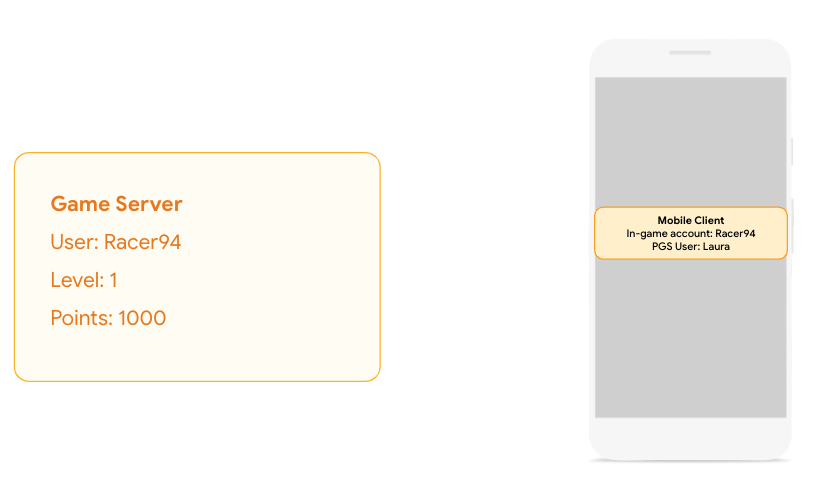
بشكل منفصل، يحفظ المطوّر رمز استدعاء لدى Google، وهو رمز يتطابق مع حساب المستخدم داخل اللعبة. تخزِّن Google تلقائيًا الرمز المميّز المخزَّن من أجل تذكُّر بيانات الألعاب في ملف المستخدم الشخصي على "خدمات ألعاب Play".

يقرّر المستخدم الآن تشغيل اللعبة على ألعاب Google Play على الكمبيوتر للمرة الأولى. تتم مصادقة المستخدم تلقائيًا باستخدام حساب "خدمات ألعاب Play"، ويتأكّد برنامج اللعبة من توفّر أي مستوى تقدّم لهذا المستخدم على "خدمات ألعاب Play". بعد ذلك، يرسل خادم اللعبة طلبًا إلى Google للاطّلاع على ما إذا كانت هناك أي رموز مميّزة لحساب "خدمات ألعاب Google Play" هذا. بما أنّ هناك حسابًا مطابقًا، يرسل Google رمز الاسترداد، ويستخدم خادم اللعبة هذا الرمز للعثور على حساب المستخدم المرتبط Racer94 واستعادة مستوى تقدّمه. بما أنّ عملية المصادقة باستخدام "خدمات ألعاب Play" لا تتطلّب أي مجهود، يستعيد التطبيق مستوى تقدّم المستخدم بدون أن يضطر إلى إدخال اسم مستخدم أو كلمة مرور. بالإضافة إلى ذلك، يمكن للمطوِّر استخدام مصادقة "خدمات ألعاب Play" مع نظام تحديد الهوية الحالي، والاعتماد على Google لتخزين الرابط بين مستوى تقدّم اللاعب وحسابه على "خدمات ألعاب Play".

كما هو موضّح في المثال السابق، هناك إجراءان رئيسيان تنفّذهما واجهة Recall API:
تخزين الرمز المميز لدى Google عندما يسجّل المستخدم الدخول باستخدام أحد الحسابات داخل اللعبة
استرداد الرمز المميّز الخاص بالمستخدم من أجل استعادة حساباته داخل اللعبة
بالإضافة إلى الرموز المميّزة لعملية تسجيل الدخول السريع، تتطلّب Recall API أيضًا معرّفًا ثابتًا يتوافق مع الحساب داخل اللعبة، ويُعرف باسم الشخصية. يمكنك اعتبار الشخصية الافتراضية بمثابة التصنيف الذي يمثّل حساب المستخدم داخل اللعبة ضمن نظام تحديد الهوية الخاص بالمطوّر، كما يمكنك اعتبار رمز الاسترداد بمثابة مفتاح يُستخدم لاستعادة حساب المستخدم داخل اللعبة. يجب عدم إعادة استخدام قيم الشخصية الرمزية والرمز المميز في مشاريع PGS مختلفة. بالإضافة إلى ذلك، على الرغم من إمكانية تغيير الرموز المميزة من أجل تذكُّر بيانات الألعاب بمرور الوقت، يجب أن تكون الشخصية ثابتة وفقًا لحساب المستخدم داخل اللعبة.
الإجراءات الفنية لتخزين الرموز المميّزة لتذكُّر بيانات الألعاب واستردادها
يتناول هذا القسم المسار الفني بين تطبيق اللعبة والخوادم مع خوادم Google عند تخزين رموز الاستدعاء واستردادها.
الخطوة 1: مصادقة مستخدم "خدمات ألعاب Play" واسترداد رقم تعريف الجلسة
تبدأ اللعبة في إعداد حزمة تطوير البرامج (SDK) لخدمات ألعاب Play وتحاول مصادقة المستخدم من خلالها.

بافتراض أنّ المستخدم قد تم التحقّق من هويته، اطلب معرّف جلسة من حزمة تطوير البرامج (SDK) الخاصة بـ "ألعاب Google" على برنامج اللعبة، واطلب رمزًا مميزًا OAuth 2.0 من الخلفية الخاصة ببروتوكول OAuth من Google. يتم استخدام معرّف الجلسة ورموز OAuth 2.0 المميزة للتواصل مع الخلفية الخاصة بـ "ألعاب Google".
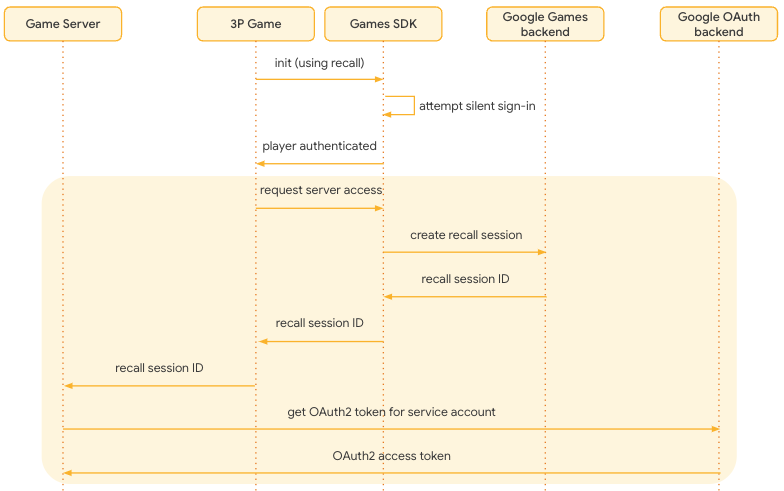
الخطوة 2: استرداد أي رمز مميّز لإعادة الاتصال متوفّر
طلب أي رمز مميَّز لإعادة العرض مرتبط بحساب مستخدم "خدمة Play للألعاب" إذا كان الرمز المميّز متوفّرًا، انتقِل إلى الخطوة 3أ واستعِد مستوى التقدّم. بخلاف ذلك، إذا كان هذا المستخدم جديدًا ولم يكن لديه رمز مميز، انتقِل إلى الخطوة 3 (ب) وخزِّن رمزًا مميزًا جديدًا.
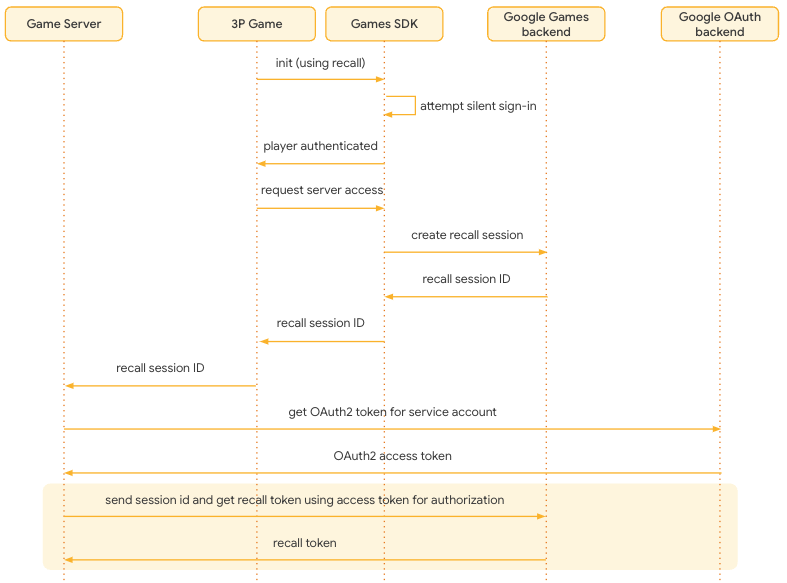
الخطوة 3 (أ): إذا كان الرمز المميّز متوفّرًا، استعادة مستوى التقدّم
إذا كان الرمز المميّز متوفّرًا، استرِده وفك تشفيره، ثم استعِد بيانات المستخدم.
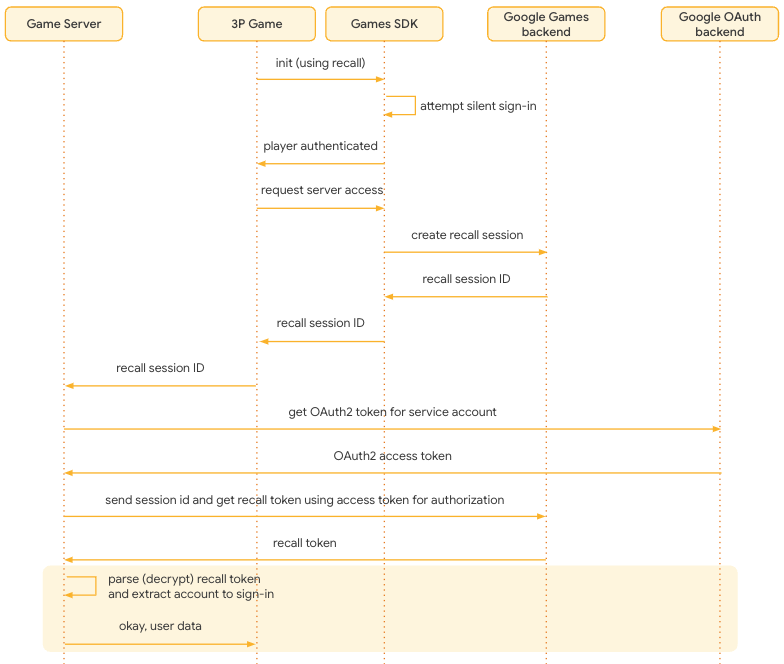
الخطوة 3ب: في حال عدم توفّر رمز مميّز، يجب تخزين رمز مميّز
بما أنّه لا يتوفّر أي رمز مميز، لن تتم استعادة أي مستوى تقدّم. ينتقل المستخدم إلى مصادقة المنصة باستخدام نظام تحديد الهوية الخاص بالمطوّر، أو ينشئ حسابًا جديدًا إذا لم يكن لديه حساب. ملاحظة: لا تتم المصادقة باستخدام "خدمات ألعاب Play" (تم ذلك من قبل)، ولكن باستخدام نظام هوية خاص بالمطوّر خارج "خدمات ألعاب Play".

أنشئ رمزًا مميزًا مشفّرًا لتسجيل الدخول السريع يشفّر حساب المستخدم داخل اللعبة، وأرسِله إلى Google مع معرّف الجلسة ورمز OAuth 2.0 المميز. في هذه المرحلة، تنشئ Google ربطًا بين رمز الاستدعاء الذي تم إرساله وحساب اللاعب على "خدمات ألعاب Play".
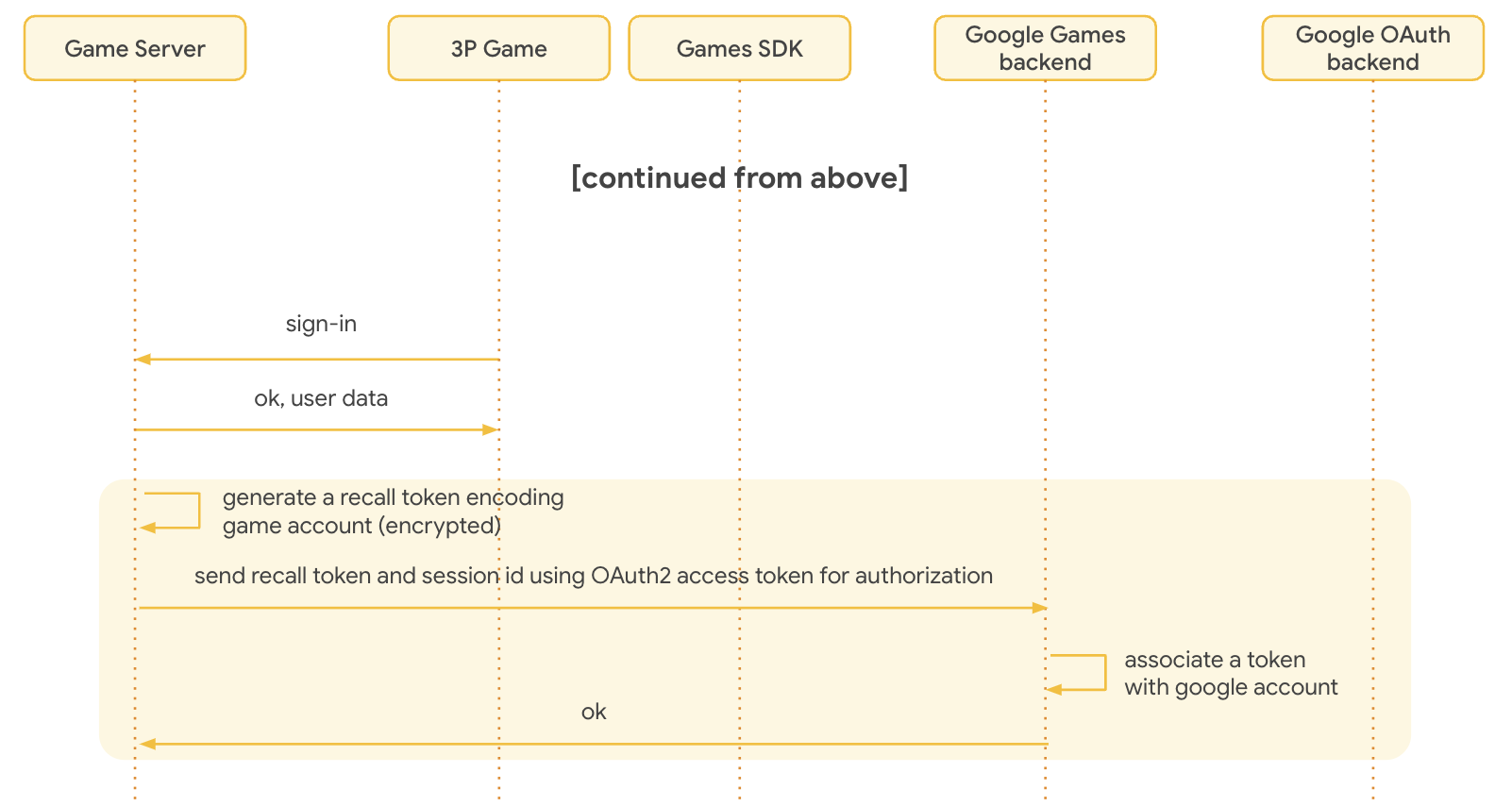
تدفقات المستخدمين الذين ليس لديهم ملف شخصي على "خدمات ألعاب Play"
يمكنك تخزين الرموز المميّزة لتذكُّر الحسابات المُستخدَمة لمستخدم لم ينشئ ملفًا شخصيًا على "خدمات ألعاب Play" بعد من خلال استخدام وضع "بدون ملف شخصي". ومع ذلك، هناك ملاحظتان مهمّتان:
- لا يمكنك استرداد الرموز المميّزة لمستخدم ليس لديه ملف شخصي على "خدمات ألعاب Play". يتم تلقائيًا طلب إنشاء ملف شخصي عندما يحاول المستخدم تسجيل الدخول إلى لعبتك باستخدام "خدمات ألعاب Play" على جهاز ثانٍ.
- عليك اتّباع إرشادات إضافية
لضمان توفير إشعار مناسب يصف العناصر التالية والحصول على موافقة المستخدمين النهائيين المناسبة:
- مشاركتك البيانات مع Google لتفعيل ميزة ربط حساب "ألعاب Play"
- مدى توفّر إعدادات لإدارة هذه المشاركة، مثل إعدادات "ألعاب Play"
- تتم معالجة هذه البيانات بموجب سياسة خصوصية Google.
تخزين رمز مميّز وشخصية
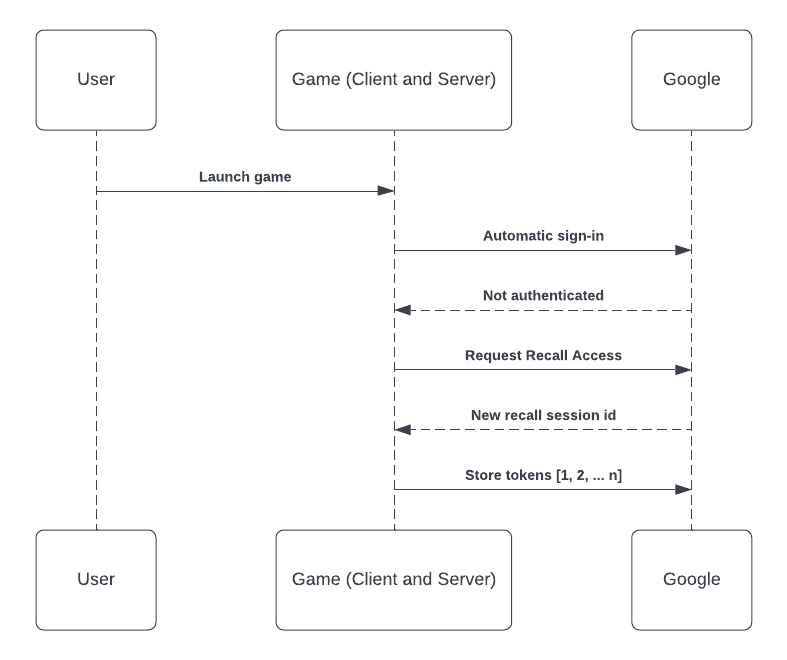
- يفتح مستخدم ليس لديه ملف شخصي في "خدمات ألعاب Play" لعبة تم تفعيل ميزة "تذكُّر الحسابات المُستخدَمة بدون ملف شخصي" فيها.
- تؤدي حزمة تطوير البرامج (SDK) للألعاب إلى بدء عملية مصادقة تلقائية على المنصة، ولكنها تفشل لأنّ المستخدم ليس لديه ملف شخصي على "خدمات ألعاب Play".
- تعرض حزمة تطوير البرامج (SDK) للألعاب شريط إشعارات يوضّح للمستخدم أنّ اللعبة تتضمّن ميزة الدمج مع Google. يمكن اتّخاذ إجراء بشأن شريط المعلومات هذا، إذ يمكن للمستخدم إيقاف ميزة "التذكير" إلى أن يتم إنشاء ملف شخصي.
- تطلب اللعبة إذن الوصول إلى ميزة "الاسترجاع". يُرجى العِلم أنّ "خدمات ألعاب Play" ترفض طلبات الوصول إلى ميزة "تذكُّر الحسابات المُستخدَمة" في حال توفُّر ملفات شخصية في "خدمات ألعاب Play" على الجهاز أو في حال عدم توفُّر حسابات Google على الجهاز. في هذه الحالة، يجب أن تستمر اللعبة بدون استخدام PGS.
- بعد أن يسجّل المستخدم الدخول باستخدام حساب داخل اللعبة، تنشئ اللعبة رمزًا مميزًا وزوجًا من الشخصيات للمستخدم يتوافق مع حسابه داخل اللعبة. وتخزّن اللعبة هذا الزوج مع Google. قد تخزِّن اللعبة المزيد من الرموز المميزة لاحقًا إذا سجّل المستخدم الدخول إلى حسابات أخرى داخل اللعبة.
تشغيل لعبة على جهاز جديد
- يفتح مستخدم ليس لديه ملف شخصي على "خدمات ألعاب Play" لعبة تم تفعيل ميزة تذكُّر الحسابات المُستخدَمة بدون ملف شخصي فيها على أحد الأجهزة.
- تسجّل اللعبة رمزًا مميّزًا لتذكُّر بيانات الألعاب بدون ملف شخصي كما هو موضّح في تخزين رمز مميّز وزوج من الشخصيات.
- يفتح المستخدم اللعبة نفسها على جهاز مختلف تم إعداد الحساب نفسه عليه.
- تؤدي حزمة تطوير البرامج (SDK) للألعاب إلى بدء عملية إنشاء الملف الشخصي. يمكن للمستخدم مراجعة الرموز المميّزة من أجل تذكُّر بيانات الألعاب التي تم تخزينها سابقًا ورفضها. ينشئ المستخدم ملفًا شخصيًا في "خدمات ألعاب Play" في هذا الوقت.
- تكتمل عملية المصادقة التلقائية على المنصة في "خدمة ألعاب Play"، وتتلقّى اللعبة حالة المصادقة.
- تسترد اللعبة رموز Recall المميّزة للمستخدم كالمعتاد.
الخطوات التالية
لدمج Recall API مع الخادم والعميل في لعبتك، يُرجى اتّباع هذه الإرشادات.
